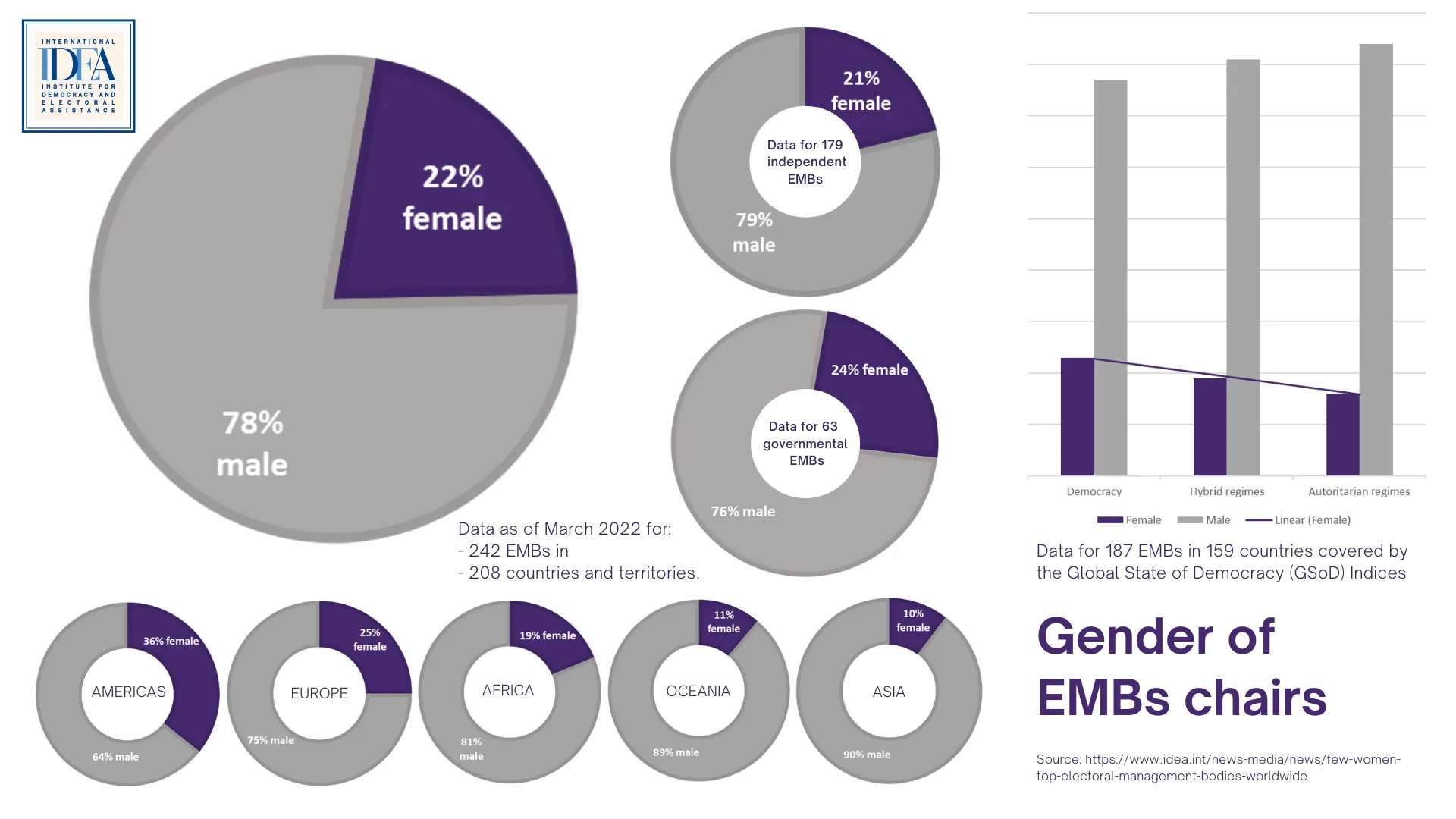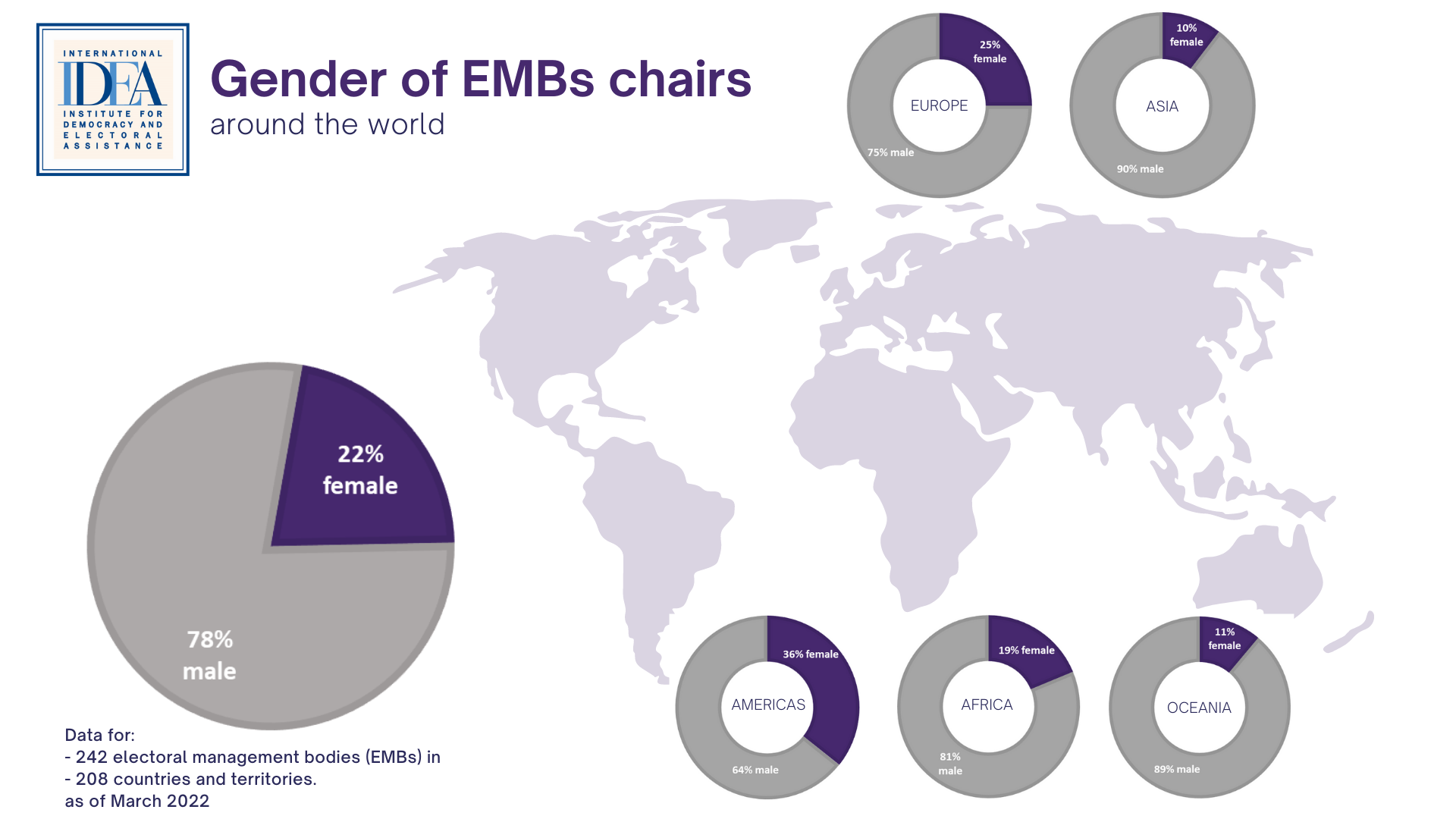Few women at the top of electoral management bodies worldwide

Electoral management bodies (EMBs) are responsible for ensuring a level playing field for political representation and meaningful participation across the entire electoral cycle. Yet, International IDEA data shows that only 22% of EMBs themselves are chaired by women.

Figure 1. Gender of EMBs chairs in the various regions of the world.
When disaggregated by regions (Figure 1.), data from 242 EMBs in 208 countries and territories shows that the percentages indicating the number of women chairing EMBs are below the global average on three continents, with Asia recording the lowest numbers (10%), followed by Oceania (11%) and Africa (19%).
Europe (24%) is slightly above the global average, while the Americas (36%) have the highest percentage of women chairs of EMBs compared to the rest of the regions.

Figure 2. Countries where independent EMBs are chaired by women.
The data in Figure 2. shows that women are slightly better represented as chairs of governmental EMBs, compared to independent electoral management bodies.
Figure 3. Gender of EMBs chairs in OECD vs non-OECD countries.
When comparing OECD with non-OECD countries (Figure 3.), a difference of 13% can be observed in the favour of the OECD group when it comes to the percentage of EMBs chaired by women. The non-OECD countries are also 2% below the global average in terms of the percentage of women chairing EMBs.

Figure 4. Gender of EMBs chairs in democracies, hybrid, and authoritarian regimes.
Data from 187 EMBs in 159 countries covered by the Global State of Democracy (GSoD) Indices indicates a correlation between the regime type and the percentage of women chairing EMBs: women seem to have better chances to hold top management positions in EMBs in democratic countries, compared to hybrid and authoritarian regimes.
- out of 117 EMBs in democracies, 23% are chaired by women,
- out of 27 EMBs in hybrid regimes, 19% are chaired by women,
- out of 43 EMBs in authoritarian regimes, 16% are chaired by women.
WHY THESE NUMBERS?
Many of the reasons women are not chosen for, or do not rise to leadership positions will be the same as for other private and public sectors and are well known, such as structural imbalances and cultural norms. Unique to electoral management is the tense political environment that can profoundly affect the conditions for work. In particular, the prevalence of disinformation and aggression in the online environment is clearly a disincentive for female leadership.
“I experienced harassment on different social media platforms.
I was targeted directly as the only woman on the leadership of the commission.
The pressure was so high that I considered resigning.”Woman, ex-president of an EMB
When electoral officials in high visibility roles are targeted by disinformation it is to discredit the institutions they represent, the processes they manage, or their professional credibility. Unique to women electoral officials is an additional layer of disinformation that portrays them as incapable of fulfilling their duties. This gendered disinformation is typically linked with societal stereotypes and misogyny.
Research shows that digital aggression in the form of humiliation, devaluation of work, instigation to violence, intimidation and threats serves to discourage them from aspiring to or remaining in leadership positions within electoral management bodies.
Social media platforms and regulatory authorities have not yet put in place measures that fit the dimension of the problem. International IDEA’s work on the effect of these malign practices on individuals, processes, and institutions in the field of electoral management will inform such actions and measures to support the resilience and leadership of women in EMBs.
Stay tuned! More detailed analysis will follow as the research advances.
Are you a current or former electoral official in a high visibility role?
Participate in our survey on the impact of disinformation and online aggression on electoral officials and
help us #BreakTheBias!
SURVEY in English
SURVEY in French
SURVEY in Spanish




